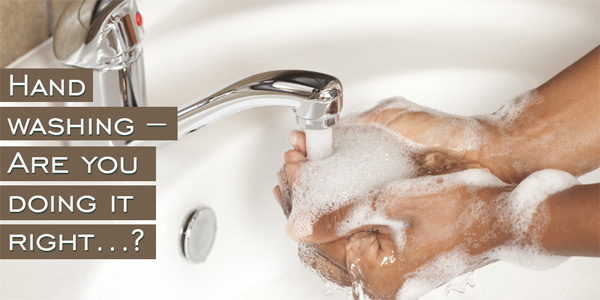Did you know…?
It takes approximately 15 to 20 seconds to wash the hands properly but studies indicate that on an average a person takes not more than 6 seconds to do it. It is estimated that 95 % of people follow an improper hand washing technique.
Frequent hand washing is one of the most effective ways to eliminate germs and prevent diseases from spreading. Washing your hands with soap can prevent the transmission of several pathogens and is therefore more effective than any single vaccine.
Approximately 2 to 10 million bacteria are present between our fingertip and elbow. Soap and water when combined together for hand washing can successfully get rid of dust and dirt but may not necessarily kill the bacteria
The efficiency of hand washing depends on the right technique
- Run your hands under the tap water
- Apply soap and rub them together (palm-to-palm) to make a lather
- Now rub the right palm above the left hand with interwoven fingers (repeated the action with the other hand)
- Scrub the backs of your hands, between your fingers, and under your nails
- Rinse hands with water
- Dry thoroughly with towel
In the absence of soap and water, you can use a hand sanitizer. Opt for Alcohol based hand sanitizers as they are proven to be more effective in eliminating the number of microbes on hands
- Take one or two squirts of the hand sanitizer in your palm
- Rub them together.
- Scrub also the front and back, between fingers, around and under nails
- Allow the hands to dry
On an average, a person touches his/her face almost 16 times in an hour. If your hands aren’t clean, diseases spread easily. Even though washing your hands gets rid of germs, there’s a right time and place to do it
- After using the washroom
- Before & after meal preparations (especially while handling raw meat, poultry and/or seafood)
- Before & after meal consumption
- After sneezing and coughing
- After petting animals or handling animal waste
- Before & after nursing an ailing patient
- After visiting a public place
- After touching open wounds
- After changing a child’s diaper
- Before wearing a contact lens and while removing the same
- Anytime your hands are dirty
It is estimated that washing hands with soap at key times can reduce diarrhea rates by over 40% and acute respiratory infections (ARI’s) by approximately 23%
Children are extremely vulnerable to germs and infections’; hence instilling good health and hygiene habits from early childhood is a must. Encouraging them to wash their hands frequently will ensure that this practice turns into a lifelong routine.


